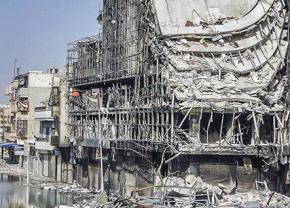Standing against barbarism
Both the Syrian regime's war on a pro-democracy uprising and the Saudi-led campaign in Yemen are aimed at burying the aspirations of the Arab Spring, writes , author most recently of Morbid Symptoms: Relapse in the Arab Uprising, in an article originally published in Arabic at Mada Masr and first published in English translation at Jacobin.
ARAB POLITICAL opinion falls into two main categories: those who condemn the murderous and destructive bombing of Syrian cities and rural areas by the Syrian regime and its Russian master, and keep silent about the murderous and destructive bombing of Yemeni cities and rural areas by the Saudi-led coalition, when they don't support the latter; and those who condemn the murderous and destructive bombing of Yemeni cities and rural areas by the Saudi-led coalition and keep silent about the murderous and destructive bombing of Syrian cities and rural areas by the Syrian regime and its Russian master, when they don't support the latter.
We hardly hear the voice of the third category, those who condemn both bombings and regard them as equally criminal (even though there is no denying that the bombing by the Syrian regime and its Russian master has caused much more killing and much greater destruction than the other). And yet this third category exists and it is certainly larger and more widespread than what its silence would lead one to believe.

It is the category of those who put the interests and safety of populations above all political considerations and reject the deplorable logic according to which "the enemy of my enemy is my friend" regardless of the nature of this "friend," the values that he represents and the goals that he pursues. The truth is, indeed, that the counterrevolutionary forces that mobilized against the great Arab uprising of 2011, known as the Arab Spring, are of various sorts and forms.
Both the Syrian regime and the Saudi one are key pillars of the old rotten Arab regime against which the uprising stood up, with the dream of being able to sweep it away and replace it with an order that would provide "bread, freedom, social justice and national dignity"--the slogan that was chanted in Cairo's Tahrir Square and numerous other squares providing the best summary of the aspirations of the Arab Spring. The purpose of both bombings--that perpetrated by the Syrian regime and its Russian master and that perpetrated by the Saudi regime and its allies--is one in essence: they both aim at burying the revolutionary process ignited in Tunisia on December 17, six years ago.
THE ROLE of the Syrian regime and its Iranian (with auxiliaries) and Russian allies in confronting the Syrian revolution and repressing it with the ugliest and vilest means at the cost of untold massacre and destruction, is as clear as could be--except in the eyes of those who don't want to see and persist in denying the reality or strive to justify it in presenting the uprising as a foreign conspiracy, thus repeating the worn-out argument of all reactionary regimes confronted with uprisings and revolutions.
As for the role of the Saudi regime in heading the Arab reaction, it is attested by the kingdom's entire history, especially since the winds of liberation from colonialism and imperialism started blowing over the Arab region. Since 2011, this role has taken different forms from direct repressive intervention as occurred in Bahrain to support to the old regime by various means as occurred in Tunisia and Egypt, as well as provision of assistance and funding to Salafist groups in Syria in order to drown the uprising in a religious sectarian ideology that suits the kingdom and thus to ward off the democratic threat that the Syrian revolution represented for Arab despotism in all its variants, and not for the Syrian Baathist regime alone.
In Yemen, the neighboring country where events are the object of its greatest concern, the Saudi kingdom intervened to foster a compromise between the very reactionary Ali Abdallah Saleh and an opposition dominated by reactionary forces. This shoddy agreement was doomed to be short-lived: it collapsed and with it collapsed the Yemeni state, leading the country in its turn into the inferno of war.
The Yemeni war is not one between a revolutionary camp and a counterrevolutionary one, but one between two camps antithetic to the fundamental aspirations for which Yemen's youth rose up in 2011. The Saudi-led intervention is supporting one side in a war between two reactionary camps and for considerations that are exclusively related to the kingdom's security. Its main tool fits well its reactionary nature: the aerial bombing of populated areas with indifference for the murder of civilians, identical in that respect to the Russian bombing in Syria, not to mention the Syrian regime's deliberate murder of civilians.
That is why it is indispensable that all those who are loyal to the hopes created by the Arab uprising and keen on reviving the revolutionary process that it unleashed and that was faced with severe reactionary relapse two years after it started, stick to a consistent attitude in condemning the reactionary onslaught that is falling from the sky, whichever its source is.
This is one aspect of what it takes to build in the Arab region a progressive pole independent of all the poles and axes of the old Arab regime and its reactionary contenders--the indispensable condition if the Arab revolution is to arise again and resume the march that it began six years ago, short of which there is no hope of overcoming the catastrophic situation into which the region has degenerated.
First published in Arabic at Mada Masr, and reprinted from English at Jacobin.


